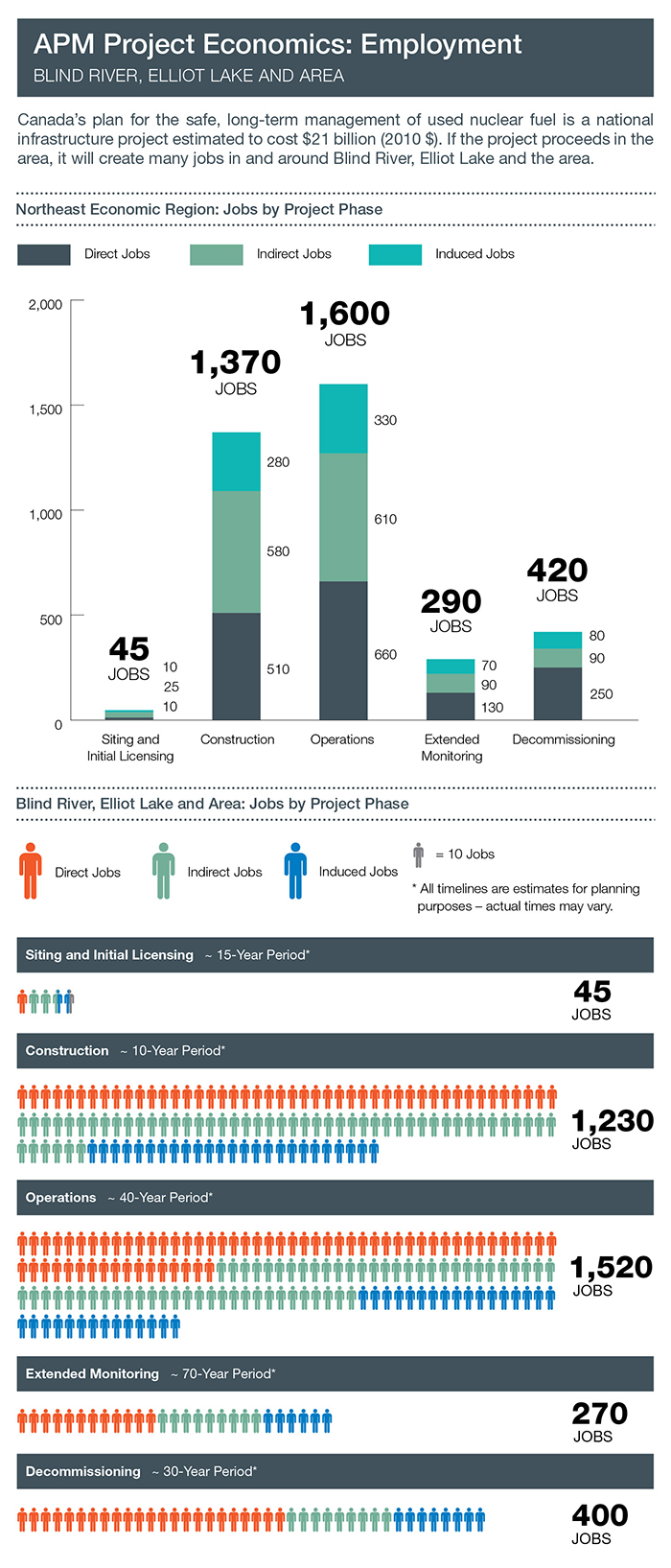Blind River, Elliot Lake and area
Overview
The communities of Blind River and Elliot Lake initiated their area's involvement in the site selection process by formally expressing interest in learning about the project in 2012. The neighbouring communities of The North Shore and Spanish also expressed interest at that time. This expression of interest triggered studies to explore potential suitability of area geology, while the communities learned more about the project and reflected on their interest.
In 2017, after several years of progressively more detailed study and engagement, we concluded that the area would not be a potential host for the project.
The project will only move forward in any area with interested communities, First Nation, Métis and surrounding communities, working together to implement it. We are committed to respecting the Indigenous rights and treaties of Indigenous peoples. We also recognize there may be unresolved claims between Indigenous communities and the Crown to be taken into account in relation to a proposed site.
Information detailing work we completed in this area is available below.
Step 1: The NWMO initiates the process
The process began with a broad program to provide information, answer questions and build awareness about the project. Awareness-building activities are designed to continue throughout the site selection process.
In Step 1, we provided general information to those who requested it. We began assessment activities in Step 2: Initial Screening only after individual communities formally expressed an interest in learning more.
Step 2: Initial Screening
In March 2012, Mayors and Councils for the interested communities in this area passed a resolution requesting an initial screening of their communities' potential suitability to host the project. This screening took us about three months to complete and involved a review based on readily available information about the geology of the community and vicinity.
We encouraged these communities to begin learning more about the project. We provided initial briefings and invited representatives to take a tour of an interim storage facility for used nuclear fuel. We also encouraged these communities to meet with the Canadian Nuclear Safety Commission to learn about the regulatory framework that will govern the project.
The initial screenings were completed in August 2012. They did not identify any obvious conditions that would exclude the general area from further consideration in the site selection process.
Resources:
Step 3: Phase 1 - Desktop studies and engagement
In late 2012, the Mayors and Councils of the interested communities in this area passed resolutions asking the NWMO to initiate a Preliminary Assessment of the community's potential suitability to host the project.
In January 2015, we completed the first phase of Preliminary Assessment (Step 3: Phase 1) of the site selection process in collaboration with these communities.
This phase involved:
- Desktop studies that explored the potential to find a site that can safely and securely contain and isolate used nuclear fuel; and
- Community learning and dialogue activities to build understanding about the project and to explore its potential to align with the community's long-term vision.
Based on studies to date, this area appeared to have strong potential for meeting strict safety and geotechnical requirements, and for the project to align with the interested communities' long-term vision. The studies also identified a number of uncertainties to be further explored through more detailed study.
The potential for the project to align with the long-term vision of Blind River and Elliot Lake was particularly strong. As a result, we identified these communities to begin working with us to help plan more detailed (Phase 2) studies and engagement in the area. The North Shore and Spanish continue to be involved in the process as communities in the area.
Resources:
Blind River:
- Integrated Preliminary Assessment Report
- Community Profile
- Phase 1 Geoscientific Desktop Preliminary Assessment of Potential Suitability for Siting a Deep Geological Repository
- Phase 1 Geoscientific Desktop Preliminary Assessment, Terrain and Remote Sensing Study
- Geoscientific Desktop Preliminary Assessment, Lineament Interpretation
- Geoscientific Desktop Preliminary Assessment, Processing and Interpretation of Geophysical Data
- Phase 1 Desktop Assessment, Environment Report
- Preliminary Community Well-Being Assessment
Elliot Lake:
- Integrated Preliminary Assessment Report
- Community Profile
- Phase 1 Geoscientific Desktop Preliminary Assessment of Potential Suitability for Siting a Deep Geological Repository
- Phase 1 Geoscientific Desktop Preliminary Assessment, Terrain and Remote Sensing Study
- Geoscientific Desktop Preliminary Assessment, Lineament Interpretation
- Geoscientific Desktop Preliminary Assessment, Processing and Interpretation of Geophysical Data
- Phase 1 Desktop Assessment, Environment Report
- Preliminary Community Well-Being Assessment
Step 3: Phase 2 - Field studies and engagement
In 2015, the NWMO began working with communities in this area to plan field studies and engagement as part of Preliminary Assessment (Step 3: Phase 2). Through fieldwork, more detailed studies and broadened engagement, Phase 2 assessments are designed to expand upon work completed in Phase 1.
In 2017, we concluded that Blind River, Elliot Lake and area will not be considered a potential host for the project.
Resources:
- Phase 2 Preliminary Assessments: Summary Findings and Decisions Based on Initial Studies in Five Siting Areas
- Phase 2 Geoscientific Preliminary Assessment Initial Findings: Town of Blind River, City of Elliot Lake and Area, Ontario
- Phase 2 Geoscientific Preliminary Assessment Acquisition, Processing and Interpretation of High-Resolution Airborne Geophysical Data: Town of Blind River, City of Elliot Lake and Area, Ontario
- Phase 2 Geoscientific Preliminary Assessment Lineament Interpretation: Town of Blind River, City of Elliot Lake and Area, Ontario
- Phase 2 Geoscientific Preliminary Assessment Geological Mapping: Town of Blind River, City of Elliot Lake and Area, Ontario
- Phase 2 Preliminary Assessment Potential for Partnership: Town of Blind River, City of Elliot Lake and Area, Ontario
- Phase 2 Preliminary Environmental Studies: Town of Blind River, City of Elliot Lake and Area, Ontario
- Phase 2 Preliminary Assessments in Crystalline Rock Settings: Working Together to Identify Study Areas
- Initial Borehole Drilling and Testing in the Area Near Blind River and Elliot Lake
- Potential Geologically Suitable Areas Based on Early Phase 2 Studies – For Discussion With People in the Blind River and Elliot Lake Area
Project Economics - Employment
To help understand the project's economic effects in potential siting areas, we have developed models that provide initial estimates. By working together to implement the project, we can optimize and direct economic benefits to meet community expectations and needs.
We have committed to implementing the project in a way that fosters well-being as defined by the people who live in the area. We continue to learn from communities about the many dimensions of well-being that are important to them. Economics is just one aspect.
If the project proceeds in the area, it will create many jobs in and around the Blind River and Elliot Lake area. Given the project’s extended time frame, there would be many opportunities for people living in the area. New families would be attracted to the area and would also contribute to area communities.
The project will create employment that includes:
Blind River:
- Project Economics: Employment, Blind River
- Economic Modelling Report for the APM Project Located in the Area Near Blind River, Ontario
Elliot Lake


